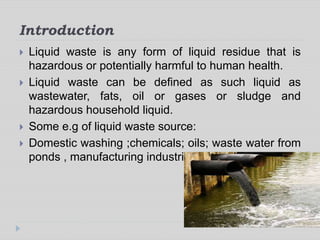Some Ideas on Reclaim Waste You Need To Know
Table of ContentsThe Only Guide to Reclaim WasteThe Ultimate Guide To Reclaim WasteHow Reclaim Waste can Save You Time, Stress, and Money.Reclaim Waste Fundamentals ExplainedNot known Details About Reclaim Waste
With appropriate liquid waste administration, business can decrease energy-intensive treatment procedures and disposal costs. By complying with a system for handling fluid waste, companies can stay clear of expensive fines and penalties and stay clear of unfavorable promotion.(https://www.metal-archives.com/users/reclaimwaste1)Accumulate representative samples from different factors within the waste stream to make certain precision. Fluid waste, specifically dangerous ones, positions considerable risks throughout this step.

is required when the effluent will certainly be recycled or discharged into municipal swimming pools. Disinfection (e.g., chlorination, ultraviolet light, ozonation) and nutrient elimination (e.g., denitrification and phosphorus eradication) are recommended under rigid regulations. This phase while doing so is strictly regulated due to the fact that it is when most dangers take place. Numerous business broke several fluid waste disposal regulations in recent years.
Things about Reclaim Waste

Superficial basins consist of fluid waste that is enabled to evaporate with natural procedures. This type of disposal is subject to stringent environmental laws due to possibly dangerous exhausts.
The findings must be recorded, examined, and saved not just for submission to regulative authorities yet also for making improvements in the future. Share info with pertinent stakeholders (e.g., workers, regulatory government agencies, and close-by areas) to keep transparency and liability.
No matter of the business size or sector, there are numerous challenges associated with this task. Understanding these can aid them successfully manage their procedures and decrease their ecological impact. makes it hard to treat and deal with fluid waste safely. Business that can't purchase centers should think about collaborating with the public field for better options.
Getting My Reclaim Waste To Work
By implementing detailed management systems that include therapy and reusing techniques, normal monitoring, risk analyses, and adherence to local and federal regulations, industrial centers can add to the protection of groundwater products, ensuring their accessibility for future generations (industrial wastewater treatment). Let's explore the importance of efficient fluid waste monitoring in the industrial industry, concentrating on its ramifications for guarding groundwater resources
The contamination of groundwater sources due to inappropriate fluid waste management in the industrial industry has far-ranging repercussions for human health, farming, and the setting overall. A few of the prospective influences triggered by such air pollution consist of: Infected Alcohol consumption Water Products: As groundwater provides a substantial portion of our drinking water, air pollution from industrial activities can bring about dangerous chemicals and bacteria entering our water supply, posing wellness threats for human beings.
Minimized Agricultural Productivity: Agriculture relies heavily on groundwater for irrigation; for that reason, polluted water can impede crop yields, contaminate agricultural products, and influence food safety and security. Offered the relevance of preserving groundwater resources, it is critical for businesses to take a positive position in managing their liquid waste properly and avoiding pollution.
Reclaim Waste Fundamentals Explained
Fluid waste can pollute land and pollute waters. Under the Security of the Atmosphere Operations Act 1997, companies that generate liquid waste are called for to manage it in a method that shields the atmosphere and the neighborhood. Information regarding handling and saving fluid waste, reacting to spills and minimizing fluid waste is available in the adhering to fact sheets and guidance:.
Water, the significance of life, is under constant risk my sources from contamination. The function of waste management specialists in guarding this valuable source can not be overemphasized. Their services consist of: Septic system and oil trap cleaning: Vital for stopping unsafe contaminants from entering our water supply. Polluted water and contaminated effluent management: Making sure that hazardous fluids are safely gotten rid of and dealt with before they can hurt our water sources.
Hence, incorporating lasting fluid waste management right into financial planning improves financial stability and shields the environment, showing the worth of this strategy. In conclusion, taking on expert fluid waste management techniques is vital for making sure a lasting future, securing our environment and safeguarding the wellness of future generations.
When it concerns taking care of waste, sticking to proper treatments is critical for a multitude of factors. Correct garbage disposal is not almost sanitation; it has to do with ensuring the health of our atmosphere, health, and the reliable use sources. Comprehending the relevance of efficient waste monitoring can aid us all add to a healthier, cleaner world.
Reclaim Waste Can Be Fun For Everyone
Effective waste management helps preserve tidy roads and public areas, lowering the visual effect of clutter and making certain that waste does not damage wild animals. When waste is not thrown away appropriately, it can bring about pollution, where unsafe substances can leach right into the dirt, water systems, and the air, producing long-term environmental problems.